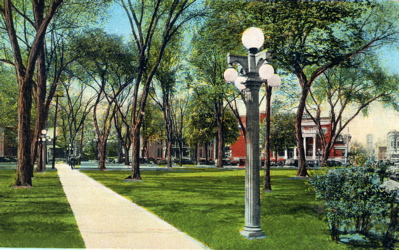Encyclopedia Dubuque
"Encyclopedia Dubuque is the online authority for all things Dubuque, written by the people who know the city best.”
Marshall Cohen—researcher and producer, CNN
Affiliated with the Local History Network of the State Historical Society of Iowa, and the Iowa Museum Association.
WASHINGTON PARK: Difference between revisions
No edit summary |
No edit summary |
||
| Line 3: | Line 3: | ||
Over the years, the land was suggested as a downtown mall extension or the site of a courthouse, post office, city hall, or parking lot. Wagons were occasionally parked on the grounds. The city fenced the square in 1848 and leveled the ground. Nothing again was done until 1877 when flower beds, trees, and shrubbery were planted. A 40-foot high oriental [[GAZEBO]] was constructed along with various benches and chairs. | Over the years, the land was suggested as a downtown mall extension or the site of a courthouse, post office, city hall, or parking lot. Wagons were occasionally parked on the grounds. The city fenced the square in 1848 and leveled the ground. Nothing again was done until 1877 when flower beds, trees, and shrubbery were planted. A 40-foot high oriental [[GAZEBO]] was constructed along with various benches and chairs. | ||
The entire area, given the name Washington Square in 1857 had been called the "public square." It was not until 1877 that the land was officially called Washington Park. On June 1, 1878, a petition was received by the City Council for the erection of a drinking fountain in the park. The council proposed that it would pay one-half of the cost with the other half coming from private donations. The resulting fountain was topped by a statue of Dr. [[COGSWELL, Henry|Henry COGSWELL]]. | [[Image:W.jpg|left|thumb|450px|Washington Park perhaps before 1878 with a turnstile on the sidewalk. Photo courtesy: Center for Dubuque History]]The entire area, given the name Washington Square in 1857 had been called the "public square." It was not until 1877 that the land was officially called Washington Park. On June 1, 1878, a petition was received by the City Council for the erection of a drinking fountain in the park. The council proposed that it would pay one-half of the cost with the other half coming from private donations. The resulting fountain was topped by a statue of Dr. [[COGSWELL, Henry|Henry COGSWELL]]. | ||
[[Image:imp850.jpg|left|thumb|450px|This rare view of Washington Park shows a view without the gazebo.]]The square has been the scene of many events. In 1896 William F. "Buffalo Bill" Cody staged a show on the grounds. President William McKinley spoke from the park's gazebo on October 16, 1899. More recently the site has seen anti-war demonstrations and the annual [[NATIVITY SCENE]]. | [[Image:imp850.jpg|left|thumb|450px|This rare view of Washington Park shows a view without the gazebo.]]The square has been the scene of many events. In 1896 William F. "Buffalo Bill" Cody staged a show on the grounds. President William McKinley spoke from the park's gazebo on October 16, 1899. More recently the site has seen anti-war demonstrations and the annual [[NATIVITY SCENE]]. | ||
Revision as of 18:55, 24 March 2012
WASHINGTON PARK. Dubuque's oldest platted park and the location of the first church and the first jail in Dubuque. The site was surveyed during the summer of 1833 by G.W. Harrison. The site was first dedicated to the county for "use as a park." In wanting to build on the land, the land was a source of controversy because the county was apparently violating the contract by which it acquired the land. In 1834 a Methodist meeting house built of logs was constructed in the southeast corner of the square. The building also served as a court and a schoolhouse. John Bush constructed a house on the northern side of he square in 1836. Philip Morhiser later took possession of the home and lived there for two years.
Over the years, the land was suggested as a downtown mall extension or the site of a courthouse, post office, city hall, or parking lot. Wagons were occasionally parked on the grounds. The city fenced the square in 1848 and leveled the ground. Nothing again was done until 1877 when flower beds, trees, and shrubbery were planted. A 40-foot high oriental GAZEBO was constructed along with various benches and chairs.
The entire area, given the name Washington Square in 1857 had been called the "public square." It was not until 1877 that the land was officially called Washington Park. On June 1, 1878, a petition was received by the City Council for the erection of a drinking fountain in the park. The council proposed that it would pay one-half of the cost with the other half coming from private donations. The resulting fountain was topped by a statue of Dr. Henry COGSWELL.
The square has been the scene of many events. In 1896 William F. "Buffalo Bill" Cody staged a show on the grounds. President William McKinley spoke from the park's gazebo on October 16, 1899. More recently the site has seen anti-war demonstrations and the annual NATIVITY SCENE.
Ravages of nature and man took their toll on the park. DUTCH ELM DISEASE and storms destroyed many of the trees. The gazebo, a victim of neglect, was completely removed in 1961.
Restoration efforts began in 1974 with suggestions made by then-candidate for the Park Board Robert A. Sullivan. TELEGRAPH HERALD reporter Jim Miller later collected $1,000.00 toward restoration costs and suggested that the Dubuque JAYCEES accept the project.
The Jaycee's Washington Square Restoration Committee, headed by attorneys Randy Nigg and Russell Neuwoehner, accepted the challenge including the construction of a replica of the original gazebo and the raising of $60,000.00 for the project. In 1976 a time capsule was buried to be opened during the tricentennial activities in 2076.




